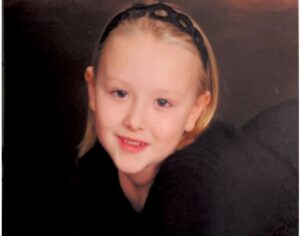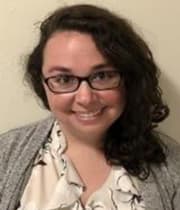Children’s Specialty Care helps family navigate daughter’s anxiety

At 7, Janessa Pihl would bottle up her emotions at school, keeping her innermost feelings from her classmates, teachers and the outside world.
“But as soon as we closed the door, every emotion she’d been holding in all day came to the forefront,” says Janessa’s mom, Tamera. “She could no longer control it.”
While always an anxious kid, Janessa’s worries and fears were compounded by the fact that both of her parents worked in law enforcement. The feelings eventually manifested as panic attacks and general and separation anxiety.
“I wouldn’t want to go to a friend’s house; I wouldn’t want to stay the night anywhere; and even going across the street to my neighbor’s house was a big thing for me,” Janessa remembers. “I always wanted to be with my parents, especially with my mom, and nighttime was really hard for me. It was big for me just being down the hallway.”
Concerned about her daughter, Tamera reached out to her friend Amy Prezbindowski, PhD, manager of the Children’s Specialty Care (CSC) program. Originally called Mary Bridge Good Samaritan Children’s Therapy Unit Psychology, CSC is now part of MultiCare Behavioral Health and supported by the MultiCare Behavioral Health Foundation.
In 2022, the Foundation helped update the program’s therapeutic games, toys and materials so children have ways to express themselves nonverbally. Donor generosity also provided training for several clinicians in Parent-Child Interaction Therapy, an evidence-based practice designed to improve the quality of the parent-child relationship.
Overcoming anxiety with self-efficacy, hard work and coping tools
Prezbindowski connected Janessa with a CSC therapist who would be by her side throughout her therapy.
At her first session, Janessa says she felt nervous and resistant. Fast-forward a couple of weeks and she began to grow more comfortable and open up to her therapist.

Janessa Pihl around age 7 when she began working with the donor-supported Children’s Specialty Care program, now part of MultiCare Behavioral Health.
With CSC, Prezbindowski’s mission is for any child who comes through the program’s doors to have access to developmentally appropriate care.
“In our current state where we’re trying to be excellent stewards of our resources and create more access to care, we (try) to really attend to developmental variables so we’re providing therapy that’s the best fit for (the) child’s cognitive ability, language ability,” she explains. The goal is to “get them through treatment, see improvement and create access for the next child who needs to come in.”
For Janessa’s recovery process, adopting The Little Engine That Could’s mantra was a pivotal starting point: “I think I can. I think I can. I think I can. I know I can.”
“That book was a huge thing we would always circle back to,” Janessa recalls. “I would say I can’t go to a friend’s house and stay the night — I can’t be apart for that long. So, my mom would say, ‘I think I can. I think I can. I think I can.’ And it was like, ‘Oh, I know I can. I know I can!’”
Janessa’s journey was long and tough at times, but she and her mom found CSC to be incredibly impactful.
“I was able to overcome so much with my anxiety, try new things and be comfortable getting used to new things,” Janessa shares. “It was a lot of figuring out that balance of, yes, this is new and sometimes scary, but this is also life — you just have to roll with the punches.”
Tamera came away with tools herself and a sense of profound pride in her daughter.
“It was very much a family journey, having us learn how to help her,” Tamera says. “It was admirable, the way Janessa’s therapist was able to break down everything and recommend books that broke anxiety down for me, so I could have some basic knowledge.
“Janessa’s ability to overcome and fight through things and be successful and do everything she’s done — it’s truly amazing,” she continues. “She has strength beyond measure.”
Helping children and youth access behavioral health care
Janessa’s time with CSC inspired her to pursue a bachelor’s degree in psychology, and she recently accepted a behavioral health position working with youth. She plans to attend graduate school and practice the same pediatric therapy she received as a child.
Part of her job will include addressing the behavioral health crisis facing so many of today’s children and youth.
“I think COVID was a major obstacle for a lot of people, and we don’t know what all the family life was like for all children,” she explains. “Being stuck at home and not having those outside resources was hard for a lot of families, and missing that peer interaction and interaction with teachers and other people was huge, too. That’s a lot of development that was limited at very important ages for development.”
This timely topic is at the heart of the Behavioral Health Foundation’s free Changing Minds events on May 3 in Seattle and May 25 in Tacoma. At both programs, guests will hear from a panel of community experts and advocates on the alarming rise in anxiety, depression and mental health distress among children and youth, and how our community is responding.

Tamera will also share her experiences as a parent of a child with mental health challenges, as well as the importance of early access to treatment and services from her viewpoint as a mom retired from law enforcement. During her 24-year career, Tamera served as a sergeant in patrol, school resource and major crimes capacities.
The Seattle luncheon and Tacoma breakfast will conclude with a paddle raise to help offer treatment at the right time, the right location and the right level for all children, from our community’s tiniest to those on the precipice of adulthood.
“As a psychologist, as a manager of community mental health, but also as a parent of two children who are graduating from college and graduating from high school this year, I see how much the pandemic has derailed so many young people from being able to cope with life,” Prezbindowski says. “We need to provide those critical supports and services right now to get them back on track.”
Attend Changing Minds on May 3 or 25 and help children and youth in need of treatment and services.




